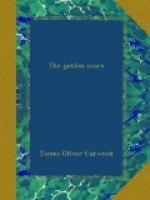It was in the third hour, seven or eight miles from the scene of slaughter, that Philip came upon the first stopping place of the sledge. The wolves had not broken their traveling rank, and for this reason he guessed that Bram had paused only long enough to put on his snowshoes. After this Philip could measure quite accurately the speed of the outlaw and his pack. Bram’s snow-shoe strides were from twelve to sixteen inches longer than his own, and there was little doubt that Bram was traveling six miles to his four.
It was one o’clock when Philip stopped to eat his dinner. He figured that he was fifteen miles from the timber-line. As he ate there pressed upon him more and more persistently the feeling that he had entered upon an adventure which was leading toward inevitable disaster for him. For the first time the significance of Bram’s supply of meat, secured by the outlaw at the last moment before starting out into the Barren, appeared to him with a clearness that filled him with uneasiness. It meant that Bram required three or four days’ rations for himself and his pack in crossing this sea of desolation that reached in places to the Arctic. In that time, if necessity was driving him, he could cover a hundred and fifty miles, while Philip could make less than a hundred.
Until three o’clock in the afternoon he followed steadily over Bram’s trail. He would have pursued for another hour if a huge and dome-shaped snowdrift had not risen in his path. In the big drift he decided to make his house for the night. It was an easy matter —a trick learned of the Eskimo. With his belt-ax he broke through the thick crust of the drift, using care that the “door” he thus opened into it was only large enough for the entrance of his body. Using a snowshoe as a shovel he then began digging out the soft interior of the drift, burrowing a two foot tunnel until he was well back from the door, where he made himself a chamber large enough for his sleeping-bag. The task employed him less than an hour, and when his bed was made, and he stood in front of the door to his igloo, his spirits began to return. The assurance that he had a home at his back in which neither cold nor storm could reach him inspirited him with an optimism which he had not felt at any time during the day.
From the timber he had borne a precious bundle of finely split kindlings of pitch-filled spruce, and with a handful of these he built himself a tiny fire over which, on a longer stick brought for the purpose, he suspended his tea pail, packed with snow. The crackling of the flames set him whistling. Darkness was falling swiftly about him. By the time his tea was ready and he had warmed his cold bannock and bacon the gloom was like a black curtain that he might have slit with a knife. Not a star was visible in the sky. Twenty feet on either side of him he could not see the surface of the snow. Now and then he added a bit of his kindling to the dying embers, and in the glow of the last stick he smoked his pipe, and as he smoked he drew from his wallet the golden snare. Coiled in the hollow of his hand and catching the red light of the pitch-laden fagot it shone with the rich luster of rare metal. Not until the pitch was burning itself out in a final sputter of flame did Philip replace it in the wallet.




